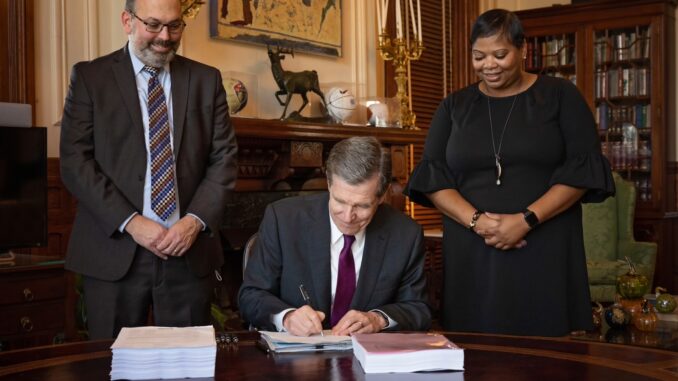RALEIGH — The recently passed state budget was the first to be enacted in a span of over three years and marked the only budget bill signed by Gov. Roy Cooper.
The two-year state budget passed the state House with a vote of 104-10 and in the State Senate 41-7. Both of those vote totals would have been more than enough to overcome a gubernatorial veto.
The Randolph County’s three primary representatives in Raleigh — Rep. Pat Hurley, Rep. Allen McNeill, and Sen. David Craven — all have seats on budgetary committees in the legislature.
Hurley and McNeill both serve as vice chairs of the full appropriations committee in the House with Hurley chairing the subcommittee on Education funding and McNeill chairing the subcommittee on Justice and Public Safety funding. Craven, in his first full term in the Senate, serves on the appropriations subcommittee on Education/Higher Education.
Last week, the three members issued a joint release touting the impacts of the state budget on Randolph County and the state. The group called the budget “historic” and highlighted “four critical areas: education, healthcare, infrastructure, and savings.”
According to legislative researchers, the budget includes the most money ever spent on education. The county delegation also said the budget puts North Carolina “in a stronger position to serve its citizens, secure its future, and compete globally.”
In Randolph County, one area related to global competition in the 1,825-acre megasite in the Northwest corner of the county.
The state budget includes $320 million for the site. Included in those funds is more than $5 million for
Randolph Community College.
While the budget does not disclose which company might be moving to the megasite, it allocates $135 million to fund the new tenant. Bloomberg reported Friday that Toyota was the likely company and that the automaker would partner with Panasonic to build batteries in Randolph County.
Economic development projects of this size are typically kept secret until certain commitments and votes can be held at the state and local levels. The next scheduled meeting of the board of county commissioners is Dec. 6.
In addition to the megasite, the budget also includes $75 million in funding for the North Carolina Zoo’s long-planned Asia/Australia exhibits. The budget also includes $5 million to expand the zoo’s parking areas and to replaces the trams.
The state budget also includes $16 million in funding for a “Randolph County Farm, Food, and Family Education Center.” According to the N.C. Cooperative Extension Service, the center would be an agriculture center funded by the American Rescue Plan Act funds. In an August release in support of the funding, the extension service called the facility a hub for agriculture education.
Some of the largest line items included $6 million for water and sewer improvements in Trinity, $1.9 million for a third fire station in Asheboro, $1.5 million for the Acme-McCrary Textile Mill, $1.5 million for Asheboro downtown facilities, and $1.3 million for the Luck’s Cannery Project in Seagrove.
The towns of Archdale, Liberty, Ramseur, and Randleman also received funding for various projects. The state budget also includes policy provisions, and Randolph County is affected directly by two provisions. The budget authorizes the City of Asheboro and Randolph County to establish a joint airport authority at the Asheboro Airport. The budget also exempts Randolph Hospital from the certificate of need laws to allow it to establish behavioral health beds.




